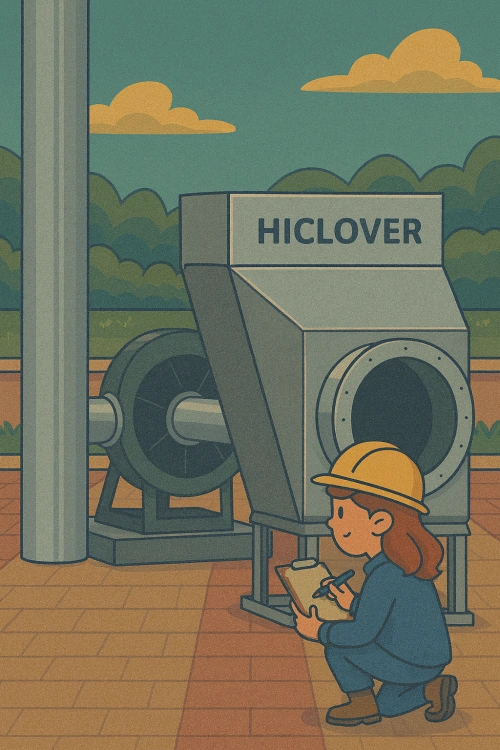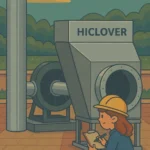Comparison Between Panel Filters and HICLOVER Automatic Roll Air Filters
In industrial and HVAC air filtration systems, panel filters and automatic roll air filters serve the same core function: to capture dust, debris, and airborne contaminants before they reach critical equipment or occupied spaces. However, their structure, efficiency, maintenance demands, and energy performance differ greatly. This article analyzes these two filter types from a technical and operational standpoint―highlighting why the HICLOVER Automatic Roll Air Filter has become a preferred choice in large-scale, continuous-duty environments such as mining ventilation, manufacturing plants, and power generation facilities.
1. Structural Design and Working Principle
Panel Filters:
Panel filters, also known as flat or framed filters, are made of fixed filter media enclosed in a metal or plastic frame. Once the media is saturated with dust, the filter must be manually replaced. These filters are typically static and suitable for light-duty or intermittent use, such as office buildings, workshops, or small ventilation systems.
HICLOVER Automatic Roll Air Filters:
In contrast, HICLOVER’s automatic roll air filter uses a continuous roll of filter media that automatically advances when the existing section becomes loaded with dust. This process is controlled by a PLC (Programmable Logic Controller) or a differential pressure sensor, ensuring consistent filtration without manual replacement. The system’s modular frame accommodates various widths and flow rates, making it ideal for high-volume HVAC and process-air systems in industrial environments.
2. Maintenance and Labor Requirements
Panel Filter Systems:
Manual replacement is required when panel filters reach their maximum dust capacity. In dusty industries like smelting or mining, frequent replacements are needed, often weekly or monthly. This increases downtime and labor cost, especially for filters located in difficult-to-access areas.
HICLOVER Automatic Roll Systems:
The automatic roll air filter eliminates the need for regular manual intervention. Its motorized media feed automatically advances clean filter material when pressure resistance rises. Maintenance personnel only need to replace the full roll after extended use―often months apart. This feature is crucial in remote facilities such as open-pit mines, offshore platforms, or power stations, where manpower efficiency is critical.
3. Filtration Performance and Energy Efficiency
Panel Filters:
Static filters tend to experience a sharp pressure increase as they load with dust, causing fan motors to consume more energy to maintain airflow. If not replaced on time, they can cause airflow imbalance and reduce system efficiency.
HICLOVER Automatic Roll Filters:
The automatic roll air filter system maintains a constant pressure drop throughout operation by advancing the media automatically. This ensures stable airflow and prevents the fan system from overworking. The low-resistance filter media and motor control design contribute to measurable energy savings across HVAC networks and process ventilation systems.
4. Application Range
Panel Filters:
Common in commercial HVAC systems, small manufacturing rooms, and simple ventilation setups, panel filters are cost-effective for environments with moderate dust loads and easy maintenance access.
HICLOVER Automatic Roll Filters:
Designed for heavy-duty and continuous-process environments, these systems are widely used in:
-
Mining and mineral processing ventilation
-
Desalination plant intakes
-
Smelting and metallurgical workshops
-
Lithium battery and clean manufacturing plants
-
Power generation and turbine intake systems
These industries benefit from HICLOVER’s low-maintenance automation, energy-efficient operation, and modular scalability.
5. Lifecycle and Cost Consideration
While panel filters may appear cheaper at purchase, their frequent replacement, labor cost, and system downtime lead to higher lifetime costs. The HICLOVER automatic roll air filter, though initially more advanced, provides long-term value through reduced maintenance frequency, lower energy usage, and uninterrupted operation.
Total cost of ownership (TCO) studies show that automated filters reduce annual operating costs by 30C50% in continuous-use facilities.
6. Technical Advantages of HICLOVER Automatic Roll Air Filters
-
PLC or ΔP sensor-based automatic control
-
Modular roll design for quick media loading
-
Consistent airflow and reduced energy draw
-
Extended system life through clean air intake
-
Applicable for large airflow (>10,000 m3/h) industrial systems
7. Conclusion
For operations where uptime, airflow consistency, and labor reduction are priorities, the HICLOVER Automatic Roll Air Filter clearly outperforms traditional panel filters. It represents a shift toward automated air quality management―particularly in Australia’s mining, manufacturing, and energy sectors, where reliability and sustainability are crucial.
Contact Information
Mobile (WhatsApp): +86-13813931455
Website: www.cloverfilter.com
Email: cloverfilter@gmail.com
2025-10-09/22:09:56

